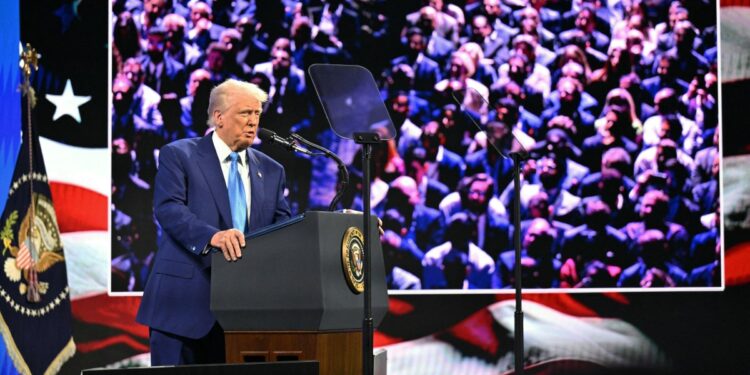US president’s proposal comes amid scepticism of claimed savings from Elon Musk’s cost-cutting drive.
United States President Donald Trump has proposed using some of the savings from tech billionaire Elon Musk’s cost-cutting drive to give Americans cash and pay down government debt.
Speaking at an investment summit hosted by Saudi Arabia’s sovereign wealth fund in Miami Beach, Florida, on Wednesday, Trump said he was considering using 20 percent of the savings for payouts to the public and 20 percent to pay down the federal government’s $36 trillion debt.
“The numbers are incredible, Elon. So many billions of dollars … hundreds of billions,” Trump told the Future Investment Initiative (FII) Institute Priority Summit, referring to savings identified by Musk’s so-called Department of Government Efficiency (DOGE)
“We’re thinking about giving 20 percent back to the American citizens, and 20 percent down to pay back debt.”
Trump’s suggestion came a day after DOGE adviser James Fishback, the CEO of investment firm Azoria, proposed a “DOGE dividend” funded by the cost-cutting initiative.
In a four-page memo posted on X on Tuesday, Fishback said every tax-paying household could be sent a $5,000 cheque assuming Musk’s task force saves $2 trillion by the time it finishes up its work in July 2026.
In response to Fishback’s memo, Musk, the CEO of Tesla and SpaceX, said on X that he would “check with the President”.
During Trump’s election campaign, Musk, the world’s richest person, predicted he could find $2 trillion in savings but later backtracked on that estimate, suggesting in an interview in January that he had a good chance of saving half that much.
DOGE, which is not an official government department, has claimed to have achieved savings of $55bn so far, but has not released detailed documentation to support that figure.
On Monday, DOGE published a list of contracts it said it had cancelled to achieve $16bn in savings.
The list, however, misstated the value of a $8m contract with Immigration and Customs Enforcement as $8bn.
Guo Xu, an associate professor at UC Berkeley Haas who studies the efficiency of government bureaucracies, expressed scepticism about Trump’s proposal to share government savings with the public.
“This seems like a populist measure designed to make the crippling of our federal government capacity more appealing,” Xu told Al Jazeera.
“Instead of cutting the government to cut checks, we should be investing to strengthen the nation’s infrastructure, science, and national security.”






